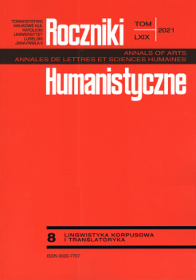Las unidades pluriverbales nominales equivalentes a compuesto en los diccionarios bilingües lituano-español/francés/inglés
Abstrakt
Jednostki wielowyrazowe jako ekwiwalenty rzeczowników złożonych w dwujęzycznych słownikach języka litewsko-hiszpańskiego/francuskiego/angielskiego
Terminy językowe compuesto, locución, colocación no estándar y termema nominales odpowiadają różnym pojęciom, ale w leksykografii dwujęzycznej i tłumaczeniu ich traktowanie jest prostsze, ponieważ wyznaczają jednostki leksykalne, które w większości są w pełni równoważne w innych językach. Jednostki te pojawiają się w słownikach jako lematy, podpunkty lub przykłady wraz z ich odpowiednikami. W tym artykule ukazujemy różnice między tymi terminami oraz ich zbieżność w ogólnym terminie rzeczownik złożony. Analizuje się korpus wyrazów złożonych w języku litewskim oraz ich ekwiwalenty w języku hiszpańskim, francuskim i angielskim (wydobyte ze słowników dwujęzycznych), co prowadzi do wniosku, że ich struktura leksykalna w wielu przypadkach jest równoległa; komponenty tworzące ich znaczenie można odnaleźć w składnikach jednostki leksykalnej.
Los términos lingüísticos compuesto, locución, colocación no estándar y termema nominales corresponden a conceptos diferentes, pero en la lexicografía bilingüe y en la traducción su tratamiento es más simple, porque designan unidades léxicas que en su mayoría tienen una equivalencia plena en otras lenguas. Estas unidades figuran en los diccionarios como lemas, subentradas o ejemplos. En este artículo determinamos las diferencias entre estos conceptos y su confluencia en el nombre genérico de compuesto nominal. Se analiza un corpus de compuestos del lituano y sus equivalentes al español, francés e inglés (extraídos de diccionarios bilingües), con una estructura léxica en muchos casos paralela; en los componentes de la unidad léxica se pueden rastrear los semas que forman su significado.
Bibliografia
Adamska-Sałaciak, Arleta. “Explaining meaning in bilingual dictionaries”. The Oxford handbook of lexicography, ed. Philip Durkin, Oxford University Press, 2016, pp. 144–160.
Adamska-Sałaciak, Arleta. Meaning and the Bilingual Dictionary. Peter Lang, 2006.
Anglonas. Anglų-lietuvių kalbų žodynas versión electrónica. Bronislovas Piesarskas. UAB “Fotonija”, 2006.
Booij, Geert. The grammar of words (3d edition). Oxford University Press, 2012.
Carter, Ronald y Michael Mccarthy. Cambridge grammar of English. Cambridge University Press, 2006.
Clave. Diccionario de uso del español actual (5ª ed.), concepción Maldonado González, dir. Humberto Hernández Hernández, SM, 1997, 2002.
Collins Spanish Dictionary. Grijalbo Random House Mondadori–HarperCollins Publishers, 2003.
Cowie, Anthony P., Ronald Mackin y Isabel R. McCaig. “Phrase, clause and sentence idioms”. Oxford dictionary of current idiomatic English. Vol. 2, Oxford University Press, 1984.
ESPASA. Diccionario de la lengua española. Espasa Calpe, 2005, www.wordreference.com/ definicion/.
García Yebra, Valentín. Teoría y práctica de la traducción (2 tomos, 3a edición). Gredos, 1997.
Grevisse, Maurice y André Goose. Nouvelle grammaire française. Duculot, 1980.
Jakaitienė, Evalda. Leksikologija. Vilniaus Universitetas, 2010.
Krzyzanowska, Anna. “Étude comparée de la terminologie linguistique: Le cas de la phraséologie française et polonaise”. Roczniki Humanistyczne, vol. 65, no 8, 2017, págs. 117–129.
LAKŽ – Didysis lietuvių-anglų kalbų žodynas. The English-Lithuanian dictionary. Bronius Piesarskas. Žodynas, 2006.
Le Petit Robert, dir. Paul Robert, Josette Rey-Debove y Alain Rey. Le Robert, 1996.
Lehmann, Alise y Françoise Martin-Berthet. Lexicologie (4e éd.). Armand Colin, 2017.
LIKŽ – Lietuvių-ispanų kalbų žodynas. Diccionario lituano-español, dir. Alfonso Rascon, Žodynas, 2002.
LPKŽ – Dictionnaire lituanien–français. Lietuvių-prancūzų kalbų žodynas, dir. Danguolė Melnikienė, Hermann, 2020.
LTI – Lietuvių kalbos institutas. Dabartinės lietuvių kalbos gramatika. Mokslo, 2006.
Mel’čuk, Igor. “Clichés, an Understudied Subclass of Phrasemes”. Yearbook of Phraseology no 6, 2015, págs. 56–86.
Mel’čuk, Igor. “Collocations and Lexical Functions”. Phraseology: Theory, analysis and applications, ed. Anthony Paul Cowie, Clarendon Press, 1998, págs. 23–54.
Mel’čuk, Igor. “Colocaciones en el diccionario”. Diccionarios y fraseología, ed. Margarita Alonso Ramos, Universidade da Coruña, 2006, págs. 11–43.
Mel’čuk, Igor. “Phraseology in the language, in the dictionary, and in the computer”. Yearbook of Phraseology, no 3, 2012, págs. 31–56.
Mickunaitytė, Daiva. Sur le mot français. Lietuvos edukologijos universiteto leidykla, 2015.
Niklas Salminen, Aïno. La lexicologie. A. Colin, 1997.
Otaola Olano, Concepción. Lexicología y semática léxica. Ediciones Académicas, 2004.
Oxford Spanish Dictionary (The). Oxford University Press, 1994, 2003.
Peters, Pam. The Cambridge Dictionary of English Grammar. Cambridge University Press, 2013.
Real Academia Española (RAE). DLE (Diccionario de la lengua española). Espasa, 2014.
Real Academia Española (RAE). Nueva gramática de la lengua española. Espasa, 2009–2011.
Svensén, Bo. A Handbook of lexicography. Cambridge University press, 2009.
Val Álvaro, José Francisco. “La composición”. BOSQUE/DEMONTE Gramática descriptiva de la lengua española. Espasa Calpe, 2000.
Zgusta, Ladislav. Manual of Lexicography. Mouton, 1971.
Copyright (c) 2021 Roczniki Humanistyczne

Utwór dostępny jest na licencji Creative Commons Uznanie autorstwa – Użycie niekomercyjne – Bez utworów zależnych 4.0 Międzynarodowe.





